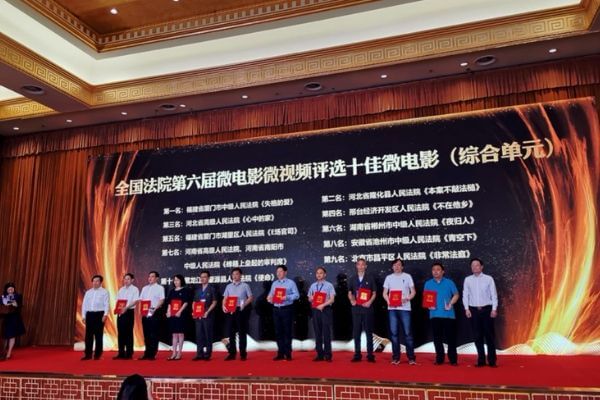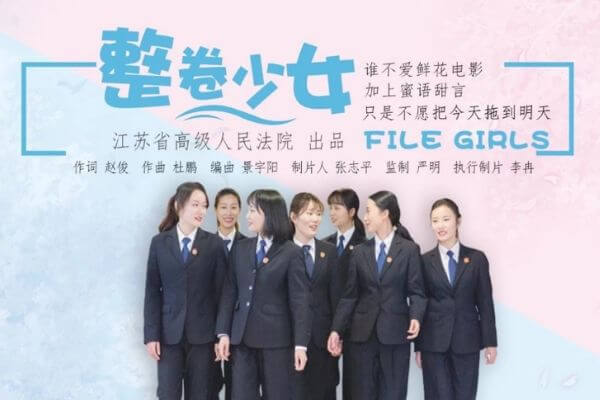
China's Supreme People's Court (SPC) has been encouraging judges to create short films and music videos.
I have just got some good news that my old friend Judge Wang Minzhong (王敏重) got the best screenplay award for his micro-film "Outlaws of Love" (失格的爱). This film won the first place among the top ten micro-films at the 6th National Micro Film and Video Awards Ceremony held by the SPC.
The awards ceremony was held on 21st Aug. 2019, which could be regarded as the Oscar of Chinese courts.
 (Awards ceremony)
(Awards ceremony)
A total of 449 micro-film and micro-video works from 30 senior people’s courts were submitted for selection. The jury panel selected the top ten micro-films, the top ten micro-videos, the five best short videos, and also other individual awards such as best director, best screenplay, best actor and actress, best supporting actor and actress.
Beginning from next year, this award will be officially named "Golden Judicial Mallet" (金法槌奖), a reminder of Oscar, being the top award for artistic and technical merit in the film industry contributed by Chinese courts.
To encourage local courts to create micro-films, the organizers also provided opportunities for the 220 judges at the ceremony to attend micro-film and micro-video creation training workshops.
Besides films, the SPC also encourages judges to create musical works.
On 27 Sep. 2019, the awards of outstanding original songs submitted by the courts at all levels nationwide were announced, which could be regarded as the Grammy of Chinese courts.
The jury panel of the event picked 40 songs from the 145 original songs submitted by the courts from all over the country for the finals, and selected the winning songs, best singer, best lyricist, best songwriter, and best MV.
My favorite award-winning MV is “File Girls” (整卷少女). To my surprise, it seems that the SPC's official account on WeChat (the biggest mobile social media in China) has the same taste as me, for the SPC also published an article on its account to recommend this MV.
 (Cover of "File Girls")
(Cover of "File Girls")
These activities run by the SPC aim at better managing public relations. These works can, to a certain extent, demystify the courts among the public at large, shorten the distance between them, and thus win more trust for the courts.
Moreover, works on certain topics can better explain to the public the specific things the courts are doing. For example, there is a special unit in this awards ceremony, i.e. top ten micro-films on judgment enforcement, which is to tie in with the Chinese courts' efforts to resolve the difficulty of judgment enforcement (see previous CJO posts on this topic).
Besides, this is a good way to relax for the judges involved. Because the litigation explosion in recent years has overloaded most judges, such creation allows them to enjoy their time while at work.
For instance, Judge Wang Minzhong, the best screenplay award winner, has been keen on writing novels and essays since he was a student in the law school, and just the same while serving as a judge now. Apart from being a criminal judge, he became a part-time scriptwriter. To complete the script of this work, Judge Wang has read a bunch of Hollywood textbooks on screenplays. I guess he may be much happier writing a script than writing a judgment.
In a word, these works show us the other side of Chinese courts and judges.
For more micro-films created by Chinese judges, you can visit the micro-film channel of Chinacourt.org (中国法院网) affiliated to the SPC. For outstanding original songs created by Chinese judges, you can visit the event page.
Now I would like to share with you the micro-film written by Judge Wang Minzhong and the MV "File Girls".
The micro-film "Outlaws of Love" is about a traffic accident case. Its circuitous development on plots arouses great curiosity and enjoyment from the audience. Only when it goes to the last minute of the film could the audience realize what really happened.
View from mainland China
The MV "File Girls" presents the routine work and daily life of a group of female law clerks and judge assistants in the court.
View from China mainland
Contributors: Guodong Du 杜国栋









